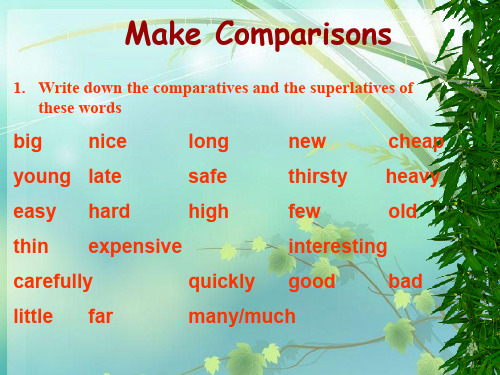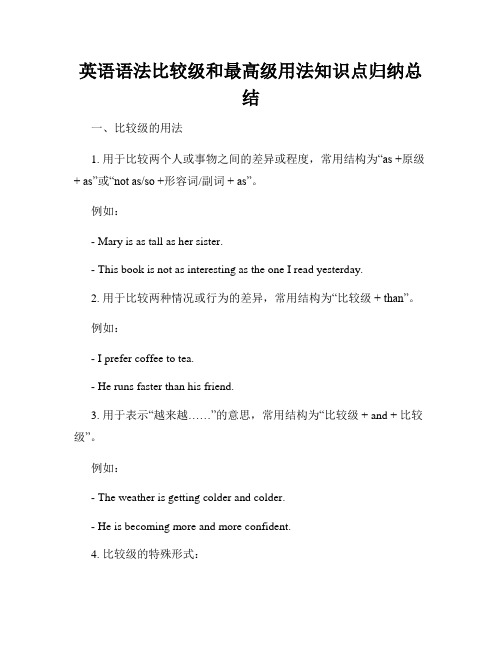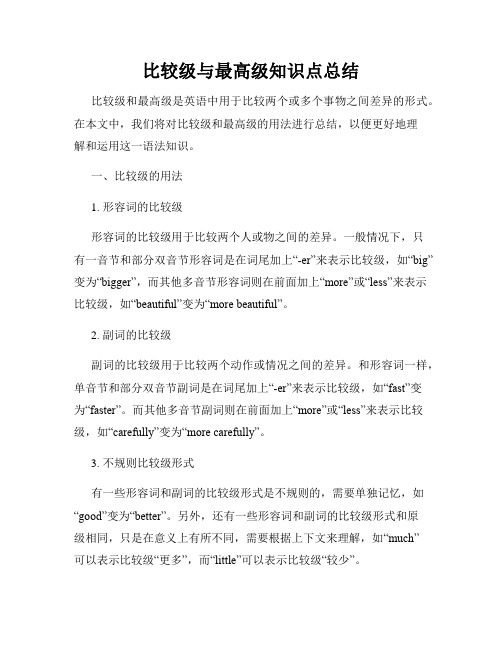[全]初中英语语法比较级和最高级知识点详解
初中英语知识点归纳比较级与最高级

初中英语知识点归纳比较级与最高级初中英语知识点归纳——比较级与最高级比较级与最高级是英语中常用的两种形式,用于比较事物的高低、程度的深浅等。
在初中英语学习中,比较级与最高级是基础而又重要的知识点。
本文将对比较级与最高级的用法进行归纳总结,帮助初中生更好地掌握这一知识点。
1. 比较级的构成比较级的构成通常是在形容词、副词前加上"-er"或在单音节词和部分双音节词前加上"more"。
例如:- 肥胖的→ fatter (形容词比较级)- 快速地→ faster (副词比较级)- 勤奋的→ more diligent (形容词比较级)- 温和的→ more gentle (形容词比较级)2. 比较级的用法(1)表示两者之间的比较。
通常在比较级前加上"than",表示某一方面的差别。
例如:- 我的狗比你的狗更大。
- My dog is bigger than your dog.(2)表示不同事物的比较。
常用的句型是:"A + be + 比较级 + than + B"。
例如:- 玫瑰花比郁金香更漂亮。
- Roses are more beautiful than tulips.(3)表示喜好或建议。
常用的句型是:"prefer + 比较级 (to + 比较对象)"。
例如:- 我喜欢喝茶胜过喝咖啡。
- I prefer tea to coffee.3. 最高级的构成最高级的构成通常是在形容词、副词前加上"-est"或在单音节词和部分双音节词前加上"most"。
例如:- 肥胖的→ fattest (形容词最高级)- 快速地→ fastest (副词最高级)- 勤奋的→ most diligent (形容词最高级)- 温和的→ most gentle (形容词最高级)4. 最高级的用法(1)表示三者或三者以上的比较。
初中知识点归纳比较级和最高级的综合运用与特殊句型

初中知识点归纳比较级和最高级的综合运用与特殊句型初中知识点归纳:比较级和最高级的综合运用与特殊句型比较级和最高级是英语中常用的形容词和副词的比较形式。
在日常交流中,我们经常会使用比较级和最高级来进行比较和描述。
同时,还有一些特殊的句型结构与比较级和最高级相关联。
本文将为您归纳总结初中英语中比较级和最高级的综合运用以及特殊句型的使用。
一、比较级的基本用法1. 比较级的构成比较级的构成通常在形容词或副词前加上-er,或在前面加more来表示。
例如:- old(老的)→ older(更老的)- big(大的)→ bigger(更大的)- slowly(慢慢地)→ more slowly(更慢地)2. 比较级的用法比较级用来比较两个人或物之间的差异。
例如:- Tom is taller than John.(汤姆比约翰高。
)- This book is more interesting than that one.(这本书比那本书更有趣。
)3. 比较级的注意事项(1)对于以“辅音字母+元音字母+辅音字母”(单音节词)结尾的形容词和副词,双写末尾字母再加-er。
(2)以“字母+y”结尾的形容词和副词,变y为i再加-er。
例如:- hot(热的)→ hotter(更热的)- happy(快乐的)→ happier(更快乐的)二、最高级的基本用法1. 最高级的构成最高级的构成通常在形容词或副词前加上-est,或在前面加most来表示。
例如:- old(老的)→ oldest(最老的)- big(大的)→ biggest(最大的)- slowly(慢慢地)→ most slowly(最慢地)2. 最高级的用法最高级用来比较三个或三个以上人或物之间的差异。
例如:- Tom is the tallest boy in the class.(汤姆是班里最高的男孩。
)- This is the most interesting book I've ever read.(这是我读过最有趣的书。
初中英语语法之比较级、最高级 PPT课件 图文

(2) 数量的比较 我的笔比你的多. I have more pens than you (do).
我喝的茶比他多. I drink more tea than he (does).
他吃的饭比我少. He has less rice than I (do).
一班的学生比二班多. There are more students in Class 1 than in Class 2.
Make Comparisons
1. Write down the comparatives and the superlatives of these words
big nice
long
new
cheap
young late
safe
thirsty heavy
easy hard
highΒιβλιοθήκη fewoldthin expensive
More examples:
He is the youngest of all the children.
This book is the most interesting of all books.
America is the most developed country in the world.
glad – more glad – most glad pleased – more pleased – most pleased tired – more tired – most tired
3、少数多音节形容词,特别是y和ow结尾的,在原 级和加er 和est构成比较级和最高级。
happy – happier – happiest
The first question is very easy, but the second one is easier.
[全]初中英语语法比较级和最高级知识点详解
![[全]初中英语语法比较级和最高级知识点详解](https://img.taocdn.com/s3/m/34cbcc7d3d1ec5da50e2524de518964bcf84d2bc.png)
[全]初中英语语法比较级和最高级知识点详解初中英语语法比较级和最高级知识点形容词、副词比较级和最高级一、定义。
比较级:两者之间的比较叫做比较级。
最高级:三者三者以上的比较叫做高级。
原级:没有比较,同级比较。
二、形容词、副词的比较级/最高级的构成。
1、单音节和部分双音节的词:(去,改,双,直)(1)以字母e结尾的形容词,去e加-er或-est;large——larger——largestXXXlate——later——latest(2)以“辅音字母+y”结尾的双音节词,先改“y”为“i”,再加happy——happier——happiestearly——earlier——earliest-er或-est;(3)辅-元-辅结构的单词(重读闭音节)的形容词,双写最后一个辅音字母再加er或者est;hot—hotter—hottestXXX——XXX——XXX(4)在末端加er大概est;strong——stronger——strongestslow——slower——slowest2、多音节词和部分双音节词:在词前加more或most。
delicious——more delicious——most deliciousbeautiful——more beautiful——most beautifulboring——more boring——most boringeasily——more easily——most easily3、不划定规矩变革(两个好,两个坏,两个多;一个小又少,另有一远和一老。
)good/well——better——XXX bad/ill/badly——worse——worstmuch/many——more——mostlittle——less——XXXXXX——XXXold——older/elder——XXX(farther是指距离或时间上"更远的''further是指程度上进一步的)4.特殊变化:既可以+er/est,又可以+more/most的单词有clever,handsome,polite,Simple,stupid,friendly。
英语语法比较级和最高级用法知识点归纳总结

英语语法比较级和最高级用法知识点归纳总结一、比较级的用法1. 用于比较两个人或事物之间的差异或程度,常用结构为“as +原级+ as”或“not as/so +形容词/副词+ as”。
例如:- Mary is as tall as her sister.- This book is not as interesting as the one I read yesterday.2. 用于比较两种情况或行为的差异,常用结构为“比较级+ than”。
例如:- I prefer coffee to tea.- He runs faster than his friend.3. 用于表示“越来越……”的意思,常用结构为“比较级 + and + 比较级”。
例如:- The weather is getting colder and colder.- He is becoming more and more confident.4. 比较级的特殊形式:- 以字母e结尾的形容词,去掉e再加-er。
- 以重读闭音节结尾的单音节形容词和部分双音节形容词,直接加-er。
- 以“辅音字母+y”结尾的形容词,把y变成i再加-er。
例如:- nice → nicer- big → bigger- happy → happier二、最高级的用法1. 用于三个或三个以上人或事物之间的比较,表示最高程度,常用结构为“the + 最高级”。
例如:- She is the tallest girl in the class.- This is the most interesting book I've ever read.2. 最高级的特殊形式:- 以字母e结尾的形容词,去掉e再加-st。
- 以重读闭音节结尾的单音节形容词和部分双音节形容词,直接加-st。
- 以“辅音字母+y”结尾的形容词,把y变成i再加-est。
例如:- nice → nicest- big → biggest- happy → happiest三、比较级和最高级的不规则形式1. 比较级和最高级的不规则形式:good → better → best, bad → worse → worst, many/much → more → most, little → less→ least。
英语比较级和最高级的基本知识

英语比较级和最高级的基本知识比较级和最高级是英语中用于比较事物的形容词和副词的两个形式。
比较级用于将两个事物进行比较,而最高级用于将三个或更多事物进行比较。
掌握这些基本知识对于正确使用和理解英语的比较概念至关重要。
一、比较级1. 形容词和副词的构成:- 单音节和部分双音节词在词尾加上 "-er" 来构成比较级,同时需要在词前加上 "more" 作为限定,如 "taller"、"more beautiful"。
- 多音节词和部分双音节词在词前加上 "more" 来构成比较级,如 "more interesting"、"more intelligent"。
2. 比较级的用法:- 比较级用于两者之间进行比较,如 "This book is more interesting than that book."- 比较级通常在句子中放在比较的两个事物之间,用 "than" 连接,如 "She is taller than her brother."- 当比较的事物是同类事物时,比较级常用来表达更高的程度,如 "I am feeling better today."3. 特殊形式的比较级:- 对于部分词尾以 "e" 结尾的词,在词尾加上 "-r",如 "nicer"。
- 部分以 "y" 或 "er" 结尾的双音节词,在词尾加上 "-er",如"happier"。
- 部分单音节词以辅音字母结尾,要先双写该辅音字母再加上"-er",如 "bigger"。
初中英语知识点归纳比较级和最高级整理

初中英语知识点归纳比较级和最高级整理比较级和最高级是英语中用来比较两个或多个事物的形式。
掌握比较级和最高级的用法是学好英语的关键之一。
下面是关于初中英语比较级和最高级知识点的整理。
1. 形容词比较级的构成比较级一般由原级词尾 + er构成,如"bigger","quicker"。
如果形容词以字母“e”结尾,只需加上"r",如"nicer"。
如果形容词以重读闭音节结尾,且末尾只有一个辅音字母,则应双写该辅音字母,再加上"er",如"bigger"。
部分形容词的比较级是不规则的,如"good"变为"better","bad"变为"worse"等。
2. 形容词最高级的构成最高级一般由原级词尾 + est构成,如"biggest","quickest"。
如果形容词以字母“e”结尾,只需加上"st",如"nicest"。
如果形容词以重读闭音节结尾,且末尾只有一个辅音字母,则应双写该辅音字母,再加上"est",如"biggest"。
部分形容词的最高级是不规则的,如"good"变为"best","bad"变为"worst"等。
3. 比较级的用法比较级可以用来比较两个人或事物之间的差异。
我们可以使用"er than"这个结构来表示比较级,例如:"He is taller than his brother." (他比他兄弟高)。
当然,有些形容词比较级的句子结构会稍有变化,如:"My house is bigger than yours." (我的房子比你的大)。
比较级与最高级知识点总结

比较级与最高级知识点总结比较级和最高级是英语中用于比较两个或多个事物之间差异的形式。
在本文中,我们将对比较级和最高级的用法进行总结,以便更好地理解和运用这一语法知识。
一、比较级的用法1. 形容词的比较级形容词的比较级用于比较两个人或物之间的差异。
一般情况下,只有一音节和部分双音节形容词是在词尾加上“-er”来表示比较级,如“big”变为“bigger”,而其他多音节形容词则在前面加上“more”或“less”来表示比较级,如“beautiful”变为“more beautiful”。
2. 副词的比较级副词的比较级用于比较两个动作或情况之间的差异。
和形容词一样,单音节和部分双音节副词是在词尾加上“-er”来表示比较级,如“fast”变为“faster”。
而其他多音节副词则在前面加上“more”或“less”来表示比较级,如“carefully”变为“more carefully”。
3. 不规则比较级形式有一些形容词和副词的比较级形式是不规则的,需要单独记忆,如“good”变为“better”。
另外,还有一些形容词和副词的比较级形式和原级相同,只是在意义上有所不同,需要根据上下文来理解,如“much”可以表示比较级“更多”,而“little”可以表示比较级“较少”。
4. 比较级的使用方法比较级在句子中可以出现在直接比较的两个人或物之前,也可以用于句子中的介词短语中。
同时,在使用比较级时,需要使用“than”来引导比较的对象,如“I am taller than my brother.”(我比我弟弟高)。
二、最高级的用法1. 形容词和副词的最高级形式最高级用于比较三个或三个以上的人或物之间的差异,表示最高程度的状态。
形容词和副词的最高级形式通常在词尾加上“-est”,如“big”变为“biggest”。
而多音节形容词和副词则在前面加上“most”或“least”,如“beautiful”变为“most beautiful”。
- 1、下载文档前请自行甄别文档内容的完整性,平台不提供额外的编辑、内容补充、找答案等附加服务。
- 2、"仅部分预览"的文档,不可在线预览部分如存在完整性等问题,可反馈申请退款(可完整预览的文档不适用该条件!)。
- 3、如文档侵犯您的权益,请联系客服反馈,我们会尽快为您处理(人工客服工作时间:9:00-18:30)。
初中英语语法比较级和最高级知识点形容词、副词比较级和最高级一、定义。
比较级:两者之间的比较叫做比较级。
最高级:三者三者以上的比较叫做高级。
原级:没有比较,同级比较。
二、形容词、副词的比较级/最高级的构成。
1、单音节和部分双音节的词:(去,改,双,直)(1)以字母e结尾的形容词,去e加-er或-est;large ——larger ——largestnice ——nicer ——nicestlate ——later ——latest(2)以“辅音字母+y”结尾的双音节词,先改“y”为“i”,再加-er或-est;happy ——happier ——happiestearly ——earlier ——earliest(3)辅-元-辅结构的单词(重读闭音节)的形容词,双写最后一个辅音字母再加er或者est;hot —hotter —hottestthin ——thinner ——thinnest(4)在结尾加er或者est;strong ——stronger ——strongestslow ——slower ——slowest2、多音节词和部分双音节词:在词前加more或most。
delicious ——more delicious ——most deliciousbeautiful ——more beautiful ——most beautiful boring——more boring ——most boringeasily ——more easily ——most easily3、不规则变化(两个好,两个坏,两个多;一个小又少,还有一远和一老。
)good/well——better——bestbad/ill/badly——worse——worstmuch/many——more——mostlittle——less——leastfar——farther/further——farthest/furthestold——older/elder——oldest/eldest(farther是指距离或时间上"更远的''further是指程度上进一步的) 4.特殊变化:既可以+er/est,又可以+more/most的单词有clever,handsome,polite,Simple,stupid,friendly。
注意:形容词最高级前通常必须用定冠词the,副词最高级前可不用. The Sahara is the biggest desert in the world.三、比较级/最高级的一般用法。
1.形容词的比较级(1)A +be/系动词+ 形容词比较级+ than + B.I am taller than you.Pie is more delicious than pizza.(2) Who/which/whose...+形容词比较级,A or B ?Who is taller,Tim or Tom?Which boy is more clever, this one or that one?注意:两者之间比较,比较级后面有名词则前面必须+the Who is the taller boy,Tim or Tom?Which is the more clever boy, this one or that one?2.副词的比较级(1) A + 行为动词+ 副词比较级+ than + B.Tim runs faster than Tom.He studies better than me.(2)Who/which/whose....+副词比较级,A or B ?Who jumps higher, Tim or Tom?Which dog eats more, this one or that one?注意:①标志词than,or②修饰比较级的词语有much,even,a little,a lot, still,far③many.more,quite,very 不能修饰比较级④只有同类事物才能作比较⑤比较句中的代替词,the one(代替可数名词单数)that (代替单数名词或不可数名词)the ones=those(代替可数名词复数)The apples in the red basket are bigger than those in the blue basket. The weather in Shanghai is warmer than that in Beijing.3. 形容词的最高级(1)A +be/系动词+ the + 形最高级+ 比较范围(of /in/among).I am the tallest in the class.Pizza is the most delicious food of the three.(2)Who/which/whose...+形容词最高级,A,B or C?Who is the tallest, Tim,Bob or Tom?4.副词的最高级(1)A + 行为动词+ 副词最高级+ 比较范围(of/in/among).Liutao runs fastest in his school.He studies best of us.(2)Who/which/whose...+副词最高级,A,B or C?Which dog eats most, the first one,the second on or the third one?注意:标志词of,among,in,or四、比较级/最高级的特殊用法。
1. 比较级的特殊用法(1)“比较级+ and + 比较级”或“more and more +原级”表示“越来越……”如:It becomes warmer and warmer when spring comes.春天来了,天气变得越来越暖和了.It is getting cooler and cooler.天气越来越凉爽.The wind became more and more heavily.风变得越来越大.Our school is becoming more and more beautiful.我们的学校变得越来越美丽.(2)“the +比较级……, the+比较级”,表示“越……越……”.The more money you make, the more you spend.钱你赚得越多,花得越多。
The sooner,the better.越快越好。
The more the better.多多益善。
The more you eat,the fatter you will be.(3) the+比较级+of the two(…) ,比较级前加the,表示两者中的更...的一个。
He works the harder of the two.She is the taller of the two.2. 最高级的特殊用法(1) one of +the +最高级+名词复数,表示“最……的……之一”这是花园里最漂亮的花之一。
This is one of the most beautiful flowers in the garden.(2) the+序数词+最高级,表示“第......最......的”The Yellow River is the second longest river in China. 黄河是中国第二长河流。
五、原级。
as...as...用法(1) A=B(程度相同): as +adj./adv.原级+as①He is as tall as Tom.他和Tom一样高。
②He runs as fast as Tom.他跑的和Tom一样快(2) A不如B: not as/so +adj./adv.原级+as①He is not as/so tall as Tom.他不如Tom高。
②He doesn’t run as/so fast as Tom.他跑的不如Tom快。
六、原级、比较级,最高级之间的转换。
(1)原级和比较级之间的转换A...+not as/so +adj./adv.原级+as...B=A...less+adj./adv.原级+than...B That book isn’t as/so interesting as this book.That book is less interesting than this book.This book is more interesting than that book.(2)比较级和最高级之间的转换(同一范围内)any other+名词单数A...adj./adv.比较级+than+ +比较范围the other+名词复数A... the+adj./adv.最高级+比较范围Tom is the tallest in his class.Tom is taller than the other students in his class.Tom is taller than any other student in his class.备注:Beijing is bigger than any city in Japan.(不同范围的比较)七、事物量的比较。
1.两种事物的比较(1)A<B,可数,A+...fewer+可数名词+than+B(2)A<B, 不可数,A+...less+不可数名词+than+B(3)A>B,可数/不可数,A+...more+可数名词复数/不可数名词+than+B He joins fewer clubs than I.We drink less coffee than teas.He has more time than I.He has more books than I.2.三种及三种以上事物的比较(1)可数名词,表示最少的...... ...the fewest+名词复数(2)不可数名词,表示最少的...... ...the least+名词(3)可数/不可数名词,表示最多的...... ...the most+名词复数She can sing the fewest songs in our class.He finishes the least homework of us.Simon drinks the most milk among the tree boys.八、表示倍数的比较级用法。
1. A is …times as big /high/long/wide/large as B.(A是B……的几倍……),两倍用twice,三倍及三倍以上用“数字+times”。
